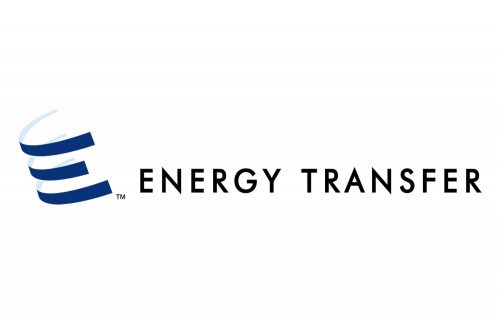Energy Transfer specializes in natural gas and propane pipeline transport. It is operated under Delaware state laws. Its assets cover 38 states in the US, as well as Canada. It has international offices in Calgary and Beijing.
Meaning and history
Unlike some companies that update their logotypes very often, the Energy Transfer logo has been pretty consistent over the years.
The history of the brand started in 1995-1996. It was created by Kelcy Warren and Ray Davis. In 2006, ETP attained the status of a publicly traded partnership. Only three years later, the first 42” diameter natural gas pipeline in Texas was finished.
Some of the notable acquisitions that took place during the company’s history were the purchase of Sunoco, Inc. and Southern Union Company in 2012. In 2014 and 2015, it acquired Susser Holdings Corporation and Regency Energy Partners respectively. In 2019, the acquisition of SemGroup took place.
Another notable event in the company’s history took place a year earlier, in 2018, when ETP and ETE merged to form Energy Transfer LP.
Yet, in spite of the fact that the history of Energy Transfer is rich in important events, the company has been loyal to its visual brand identity.
What is Energy Transfer
Energy Transfer LP is a Dallas-based pipeline operator. Its pipelines carry about a third of the crude and natural gas in the United States. As of 2021, it was ranked No 81 on the Fortune 500 list.
1995/1996 – present
Like many other commercial logotypes, the Energy Transfer logo consists of two basic elements, an emblem and a wordmark.
The emblem, which is positioned at the left-hand side, is rather abstract but conjures up certain images. There are three parallel curves placed one above the other that look very dynamic. In a way, we can interpret it as a depiction of a pipeline. The most notable thing about it is that the designers who worked on the logo managed to introduce some implied motion to the emblem. That’s not so easy to do when you depict just a pipeline.
Also, the way the elements are positioned conveys a sort of “growth and evolution” message as they are somewhat similar to steps.
When it comes to the wordmark, it’s not nearly as unique as the emblem. There is just the name of the brand set in a generic sans serif typeface. The majority of the letters have regular proportions and shapes. The only exception is probably the “N’s” – on both of the glyphs, the angular parts stretch slightly further than they should.
On the one hand, this adds an unusual touch, on the other, it is rather subtle and is only visible at larger sizes.
All things considered, we can say that the logo still looks unique and recognizable enough. This is mostly due to the emblem, while the main purpose of the typeface is just to introduce the name of the company and not outshine the emblem.
Colors and font
A palette based on dark blue and black is widespread and is often used by companies that want to emphasize their business part rather than appeal to the emotions of the customers. This color scheme lets them stay on the safe side without dividing their audience, which often happens in the case when rare colors are used. The light and calm shade of blue added as an accent helps to add some depth and diversity without affecting the overall “business” impression.








